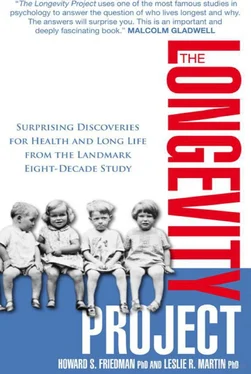What About Skipping Ahead?
Linda was not an early starter, but she was an easy starter. She did well in all of her classes, even penmanship. She had many friends, and her teacher observed that she was unselfish and had a level of common sense that was “above average.” She enjoyed her dolls and playing hopscotch. Thus, she was a “traditionalist” both in school age and activities. Linda also liked to study—everything seemed easy for her to learn. Linda in fact accelerated in her third-grade year, completing two grades in that same year and skipping on to fifth grade. Was that a good idea?
Because the Terman children entered school at different ages, and because some skipped or repeated grades, they had very different grade school experiences. At the end of eighth grade, some students were the same age as their classmates, while others were older or younger. We wondered if the onset of adolescence was the key turning point. But it wasn’t: age match with peers as a teenager was not significantly related to mortality risk; it was age at school entry that made the difference. Linda, for example, remained popular and well-adjusted, continued to do well in school, and appeared to be no worse off for having sprinted through her third- and fourth-grade years.
So maybe the problem with early school entry was pushy parents, relentlessly pressing their preschoolers to get ahead. To check, we considered that perhaps what really mattered was the age at which the child learned to read. In fact, about a third of the children learned to read before first grade, especially those who had more preschool instruction and whose parents were better educated and of a higher occupational status. Did it matter? To long life, no. Being a very early reader was associated with somewhat poorer mental adjustment later in life, but the age at which the child started reading was not related to lifelong mortality risk. Being bright and precocious was not the problem. The problem was starting formal schooling too young.
To understand these findings, let’s consider Philip. A bright boy, even compared to other Terman subjects, Philip was a front-runner in many areas. He moved from a bottle to solid food at an earlier age than most infants, his teeth came in early, and he walked and talked earlier than other children. Even his worries seemed adultlike. He was energetic, outgoing, and clearly very smart, so it’s not surprising that his mother wanted to channel this energy and brilliance into something more constructive than taking apart his toys and racing pell-mell up and down the stairs. She may have also hoped that the structured environment of the classroom would help make Philip more responsible and diligent—he was friendly and popular but not very conscientious or persistent.
Unfortunately her plan didn’t work. By entering formal instruction at a very early age, Philip lost the unstructured playtime that psychologists know to be so important to healthy development. Philip’s performance in school was competent but uneven. In some areas (those that interested him) his teacher rated him as “very superior” but in subjects he cared less about, he was only average. His attitude in his early school years suggested that he was “anxious to outdistance others, to progress or excel” but despite this, he exhibited little followthrough in areas that failed to draw his attention. He was generally well liked by his peers, and not often teased, but his teacher remarked that he tended to “seek attention by behavior.” Accelerating the pace of life for this precocious and anxiety-prone child reinforced unhealthy levels of stress.
We know now (although it was not understood then) that the brains of children, and even teenagers, are still developing. Philip’s problems with impulse control and focus were not likely to be helped by a competitive classroom environment. And, being one of the youngest in the class, he probably felt the need to prove himself.
Education is a great predictor of future income in our society—college graduates earn much more than high school graduates, and those with graduate degrees tend to do better than those without. There is also very good evidence from various studies that socioeconomic status is relevant to health. But this doesn’t necessarily mean that getting more education will make you live longer.
It is usually difficult to separate influences of education from influences of intelligence—smarter individuals generally go further in school, are healthier, understand more about health, and live longer. So we thought it would be important to examine education and its effect among the Terman participants, all of whom were smart. Did the best-educated subjects live the longest?
Pretty much all of the Terman participants attended at least some high school and about two-thirds graduated from college, with many of them going on to get graduate degrees. That left many others who did not go to or finish college. In fact fifty-three men flunked out! They were all smart but lots of things in life mattered more than intelligence in determining who would become highly educated. Fewer than a third of those in college graduated with honors—given how intelligent they were, it seemed many did not try very hard.
We were surprised to find that level of education by itself was not a very good predictor of later health and longevity. The better-educated Terman subjects did tend to be healthier and live a little longer, but this was not an important factor compared to other personal and social predictors of health and long life that often went along with success in school. The better educated were more productive as they aged—they were more successful in their careers and more likely to continue to work, grow personally, be creative, and “do” things. But this was not primarily because of their education. Instead it was because they were the kind of persistent people who were better able and better motivated to navigate life’s personal and social challenges.
Those participants who went on to be better educated, more successful, and healthier had parents who were better educated and more successful themselves. Their parents valued the accomplishments of the highly proficient members of society. Such high expectations and supportive social environments then combined with inherent characteristics of certain children and helped push them down healthier pathways of life.
What It Means for You: Guideposts to Health and Long Life
By the time of his death in 1956, Dr. Terman and his study had discredited the stereotype of child prodigy as nerd, geek, or weirdo. Over 95 percent of these bright children were still participating in the study, and the majority continued to flourish and achieve in multiple domains. But despite their natural abilities, these people differed in their personalities, their perseverance, and the deeper education they achieved. Those who thrived in their schooling from childhood on and managed to apply their skills to interpersonal and social spheres did well not only in life but in health. Except they never did manage to polish their awful handwriting.
These days there is increasing attention to early life experiences and later life health. This is both good and bad. The good side is that health professionals are starting to recognize that many diseases of middle age have some very early origins. The bad side is that these risks are often seen as much more threatening and much less changeable than they really are. We have found that a number of important health-relevant patterns are usually launched in childhood and youth but also that these patterns can be altered and improved . In the coming chapters we’ll explore some of these in detail—patterns of marriage and divorce, good and bad exercise, career successes and failures, religions and congregations, and more.
Читать дальше











